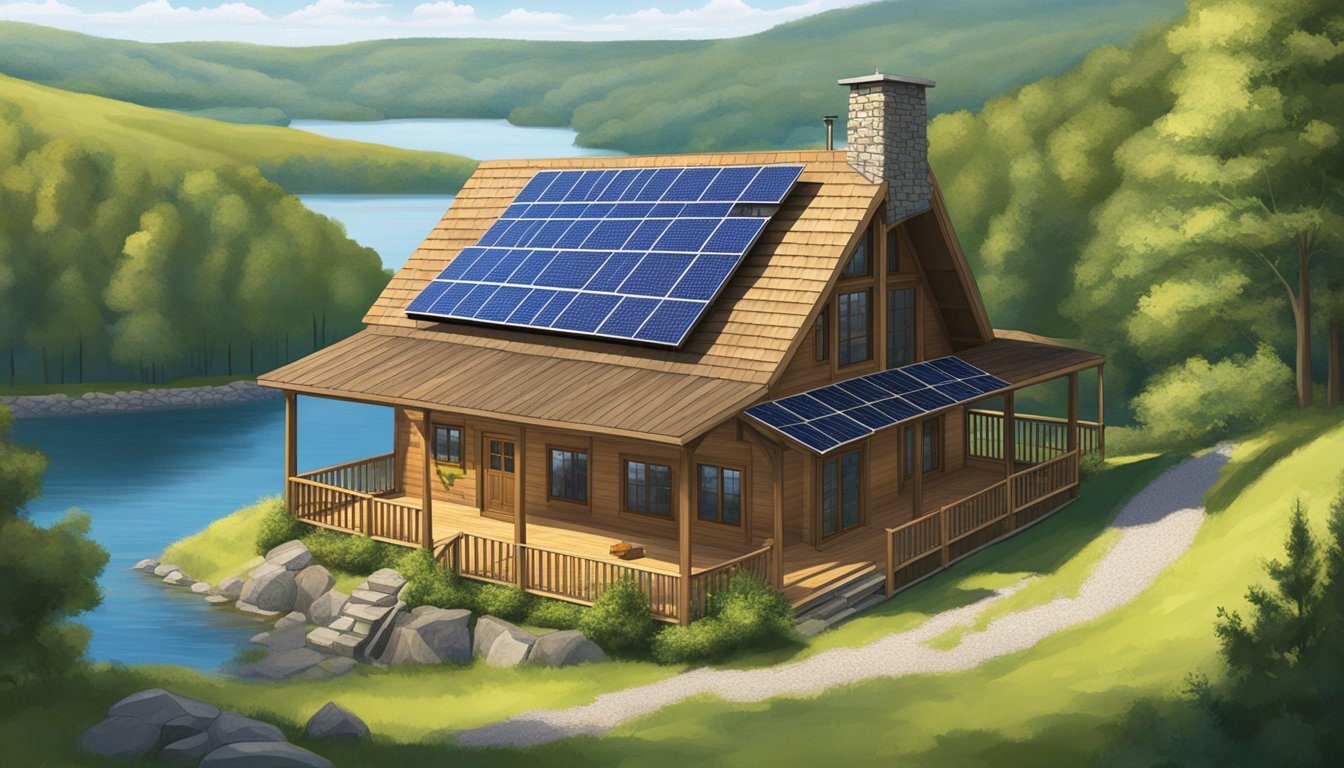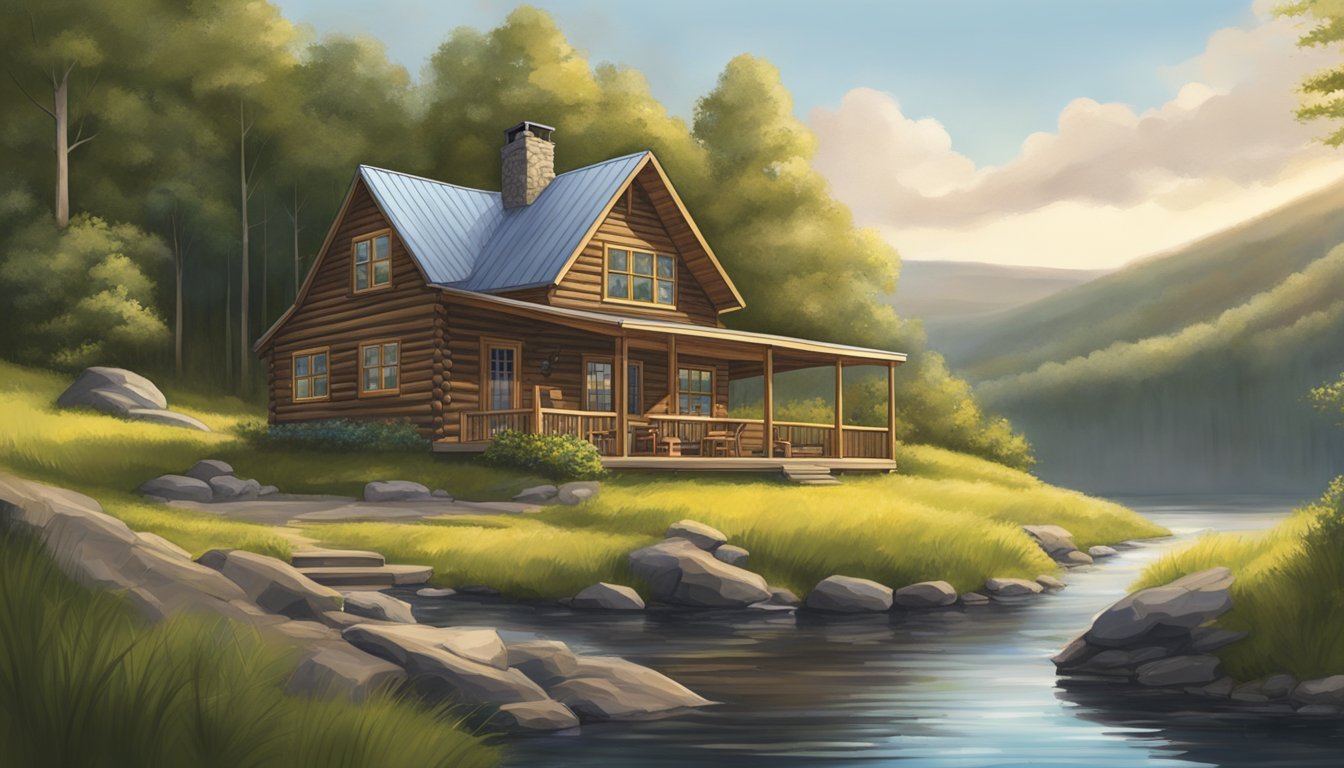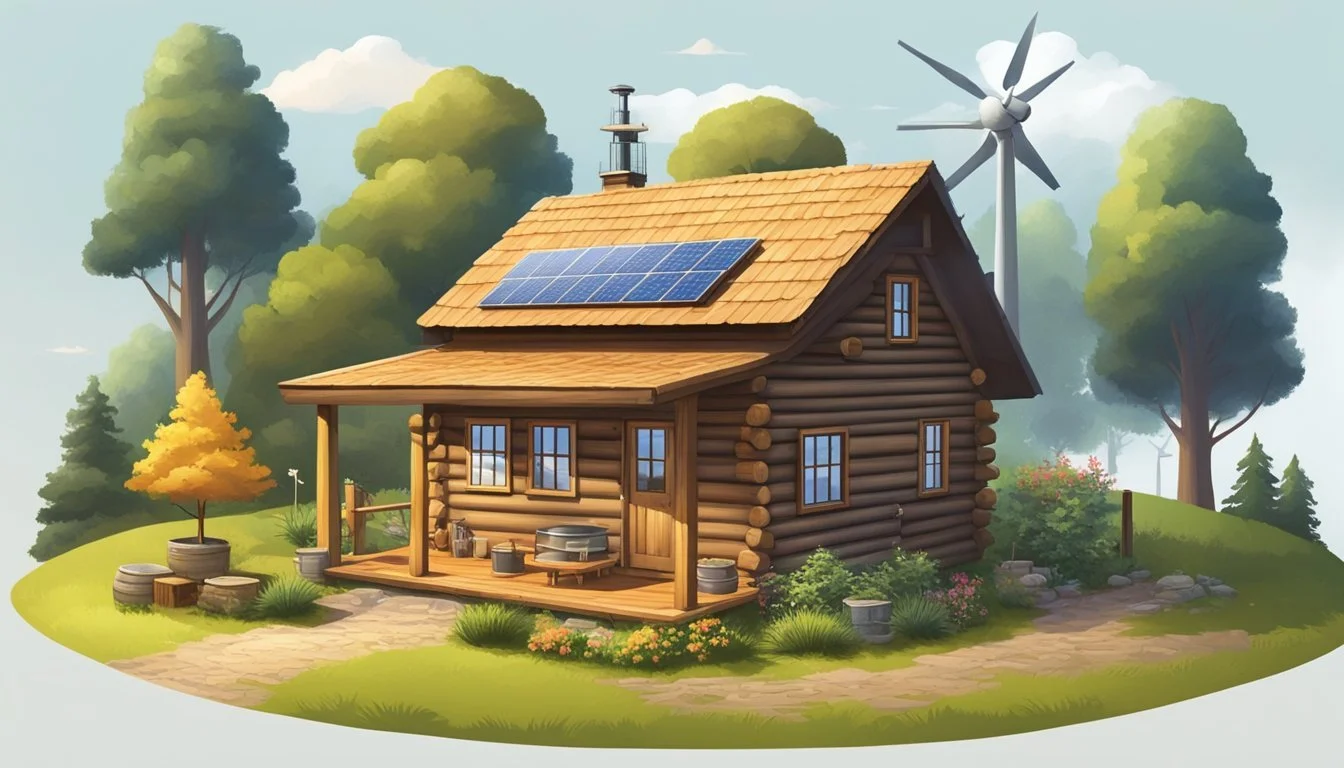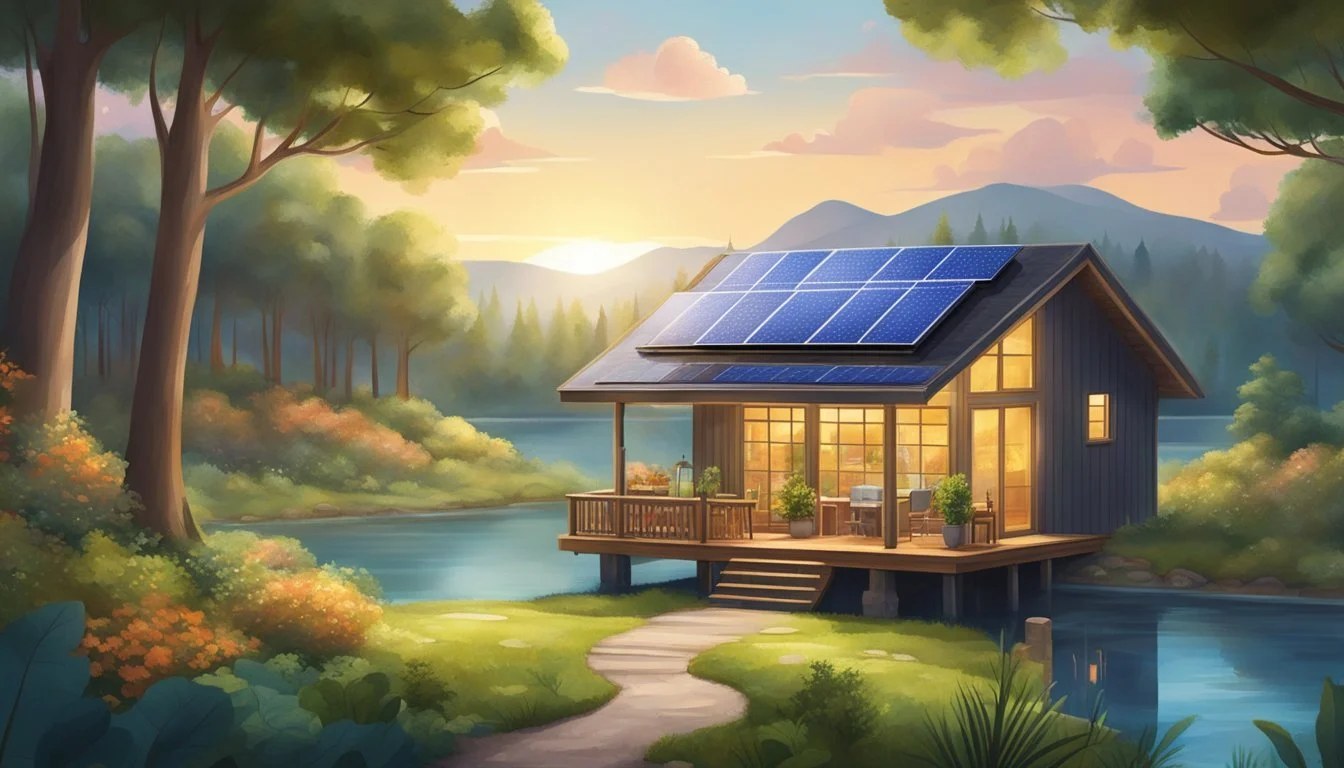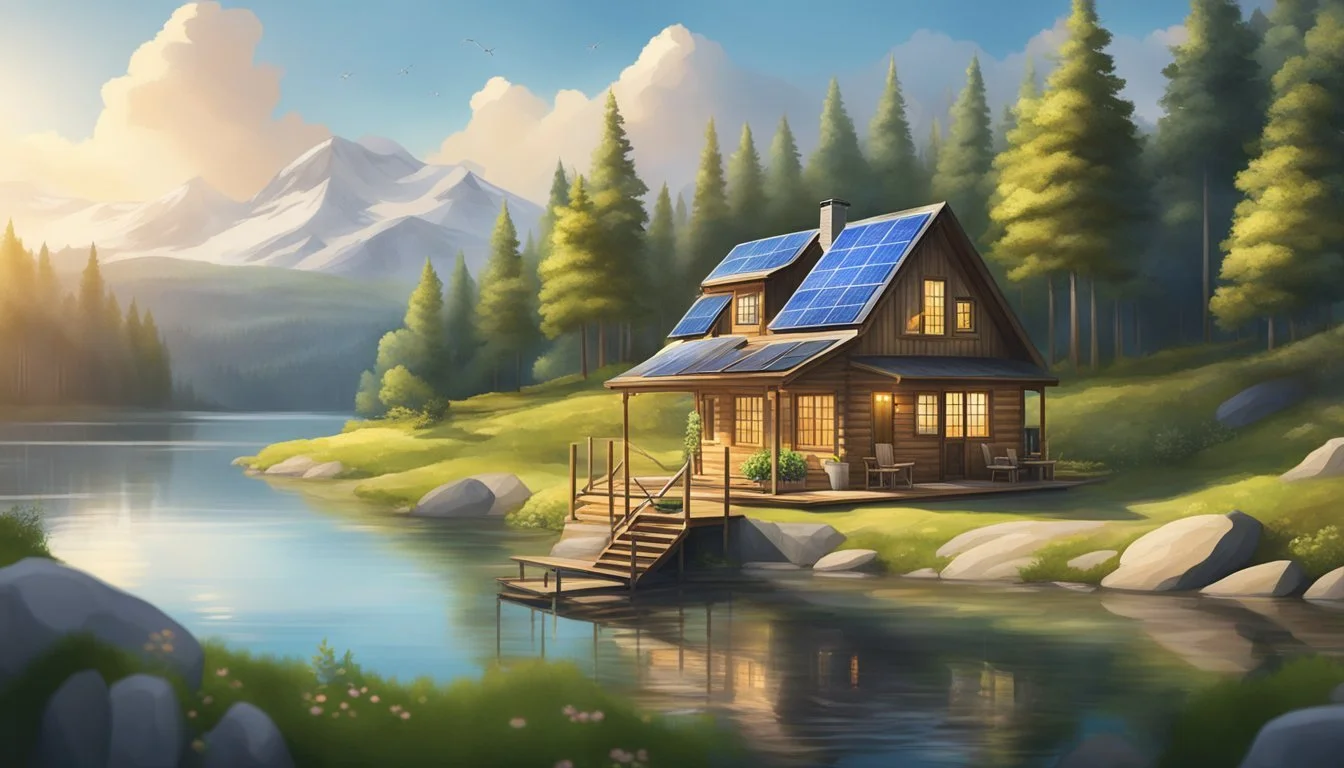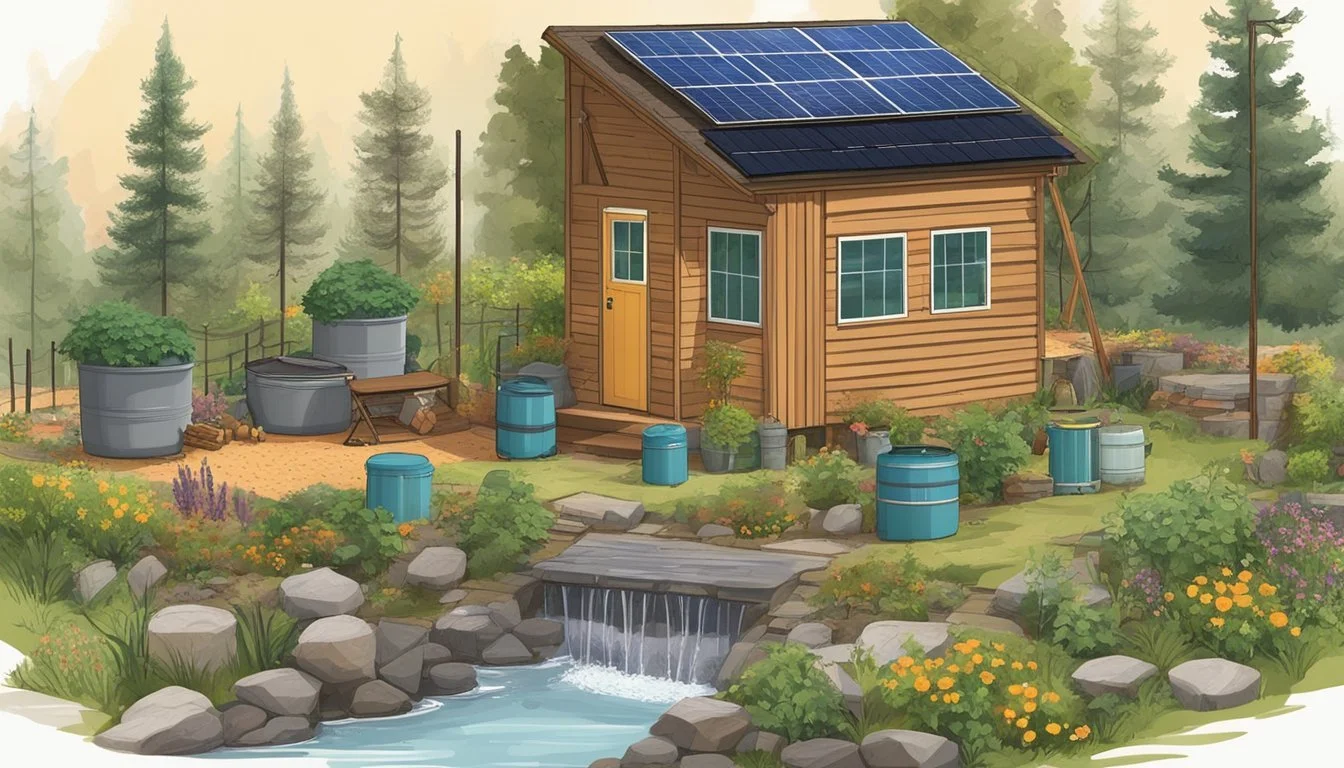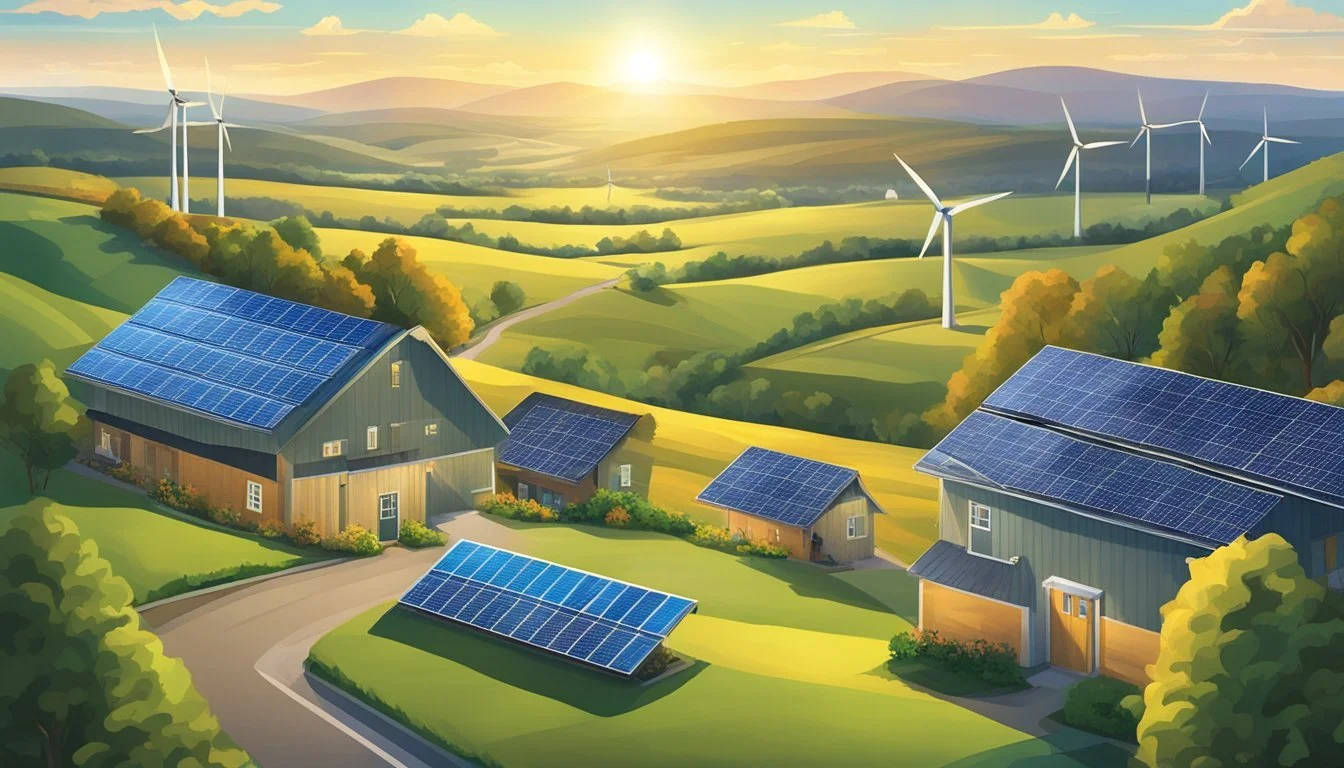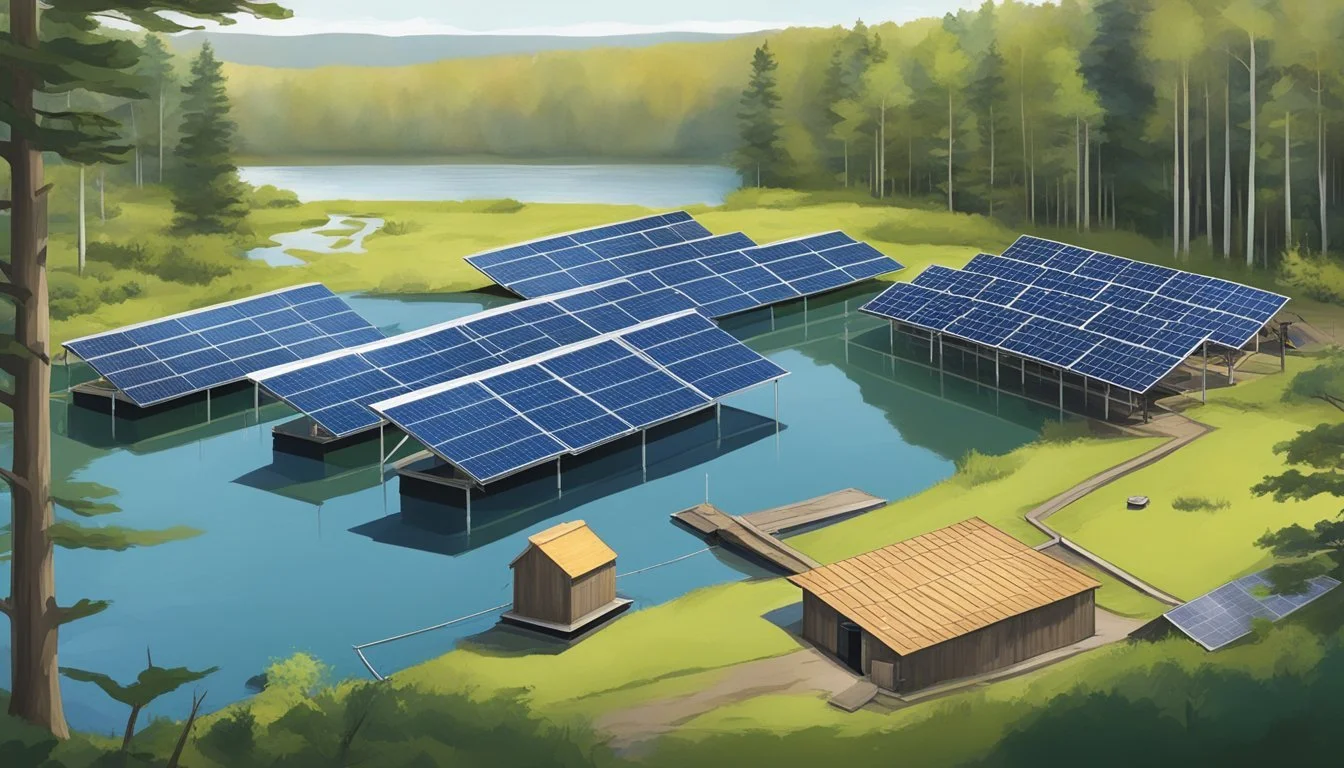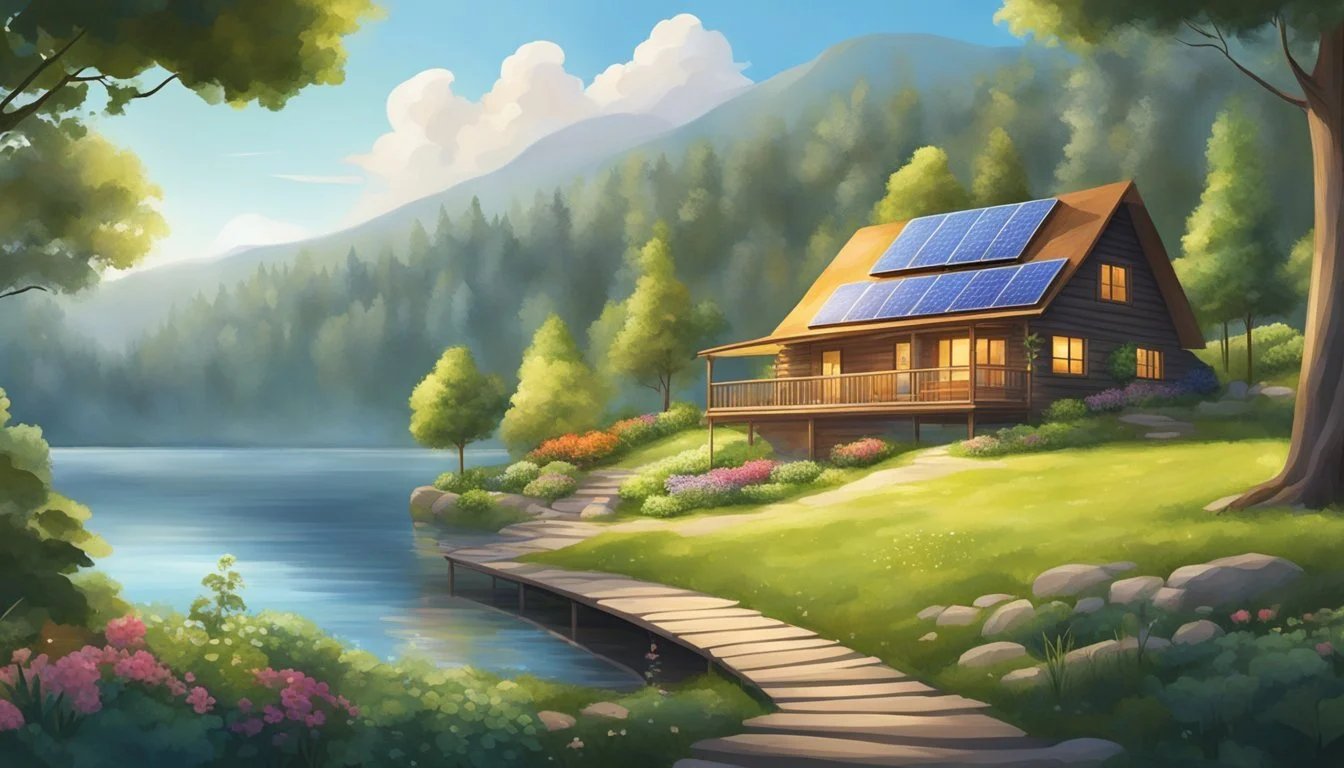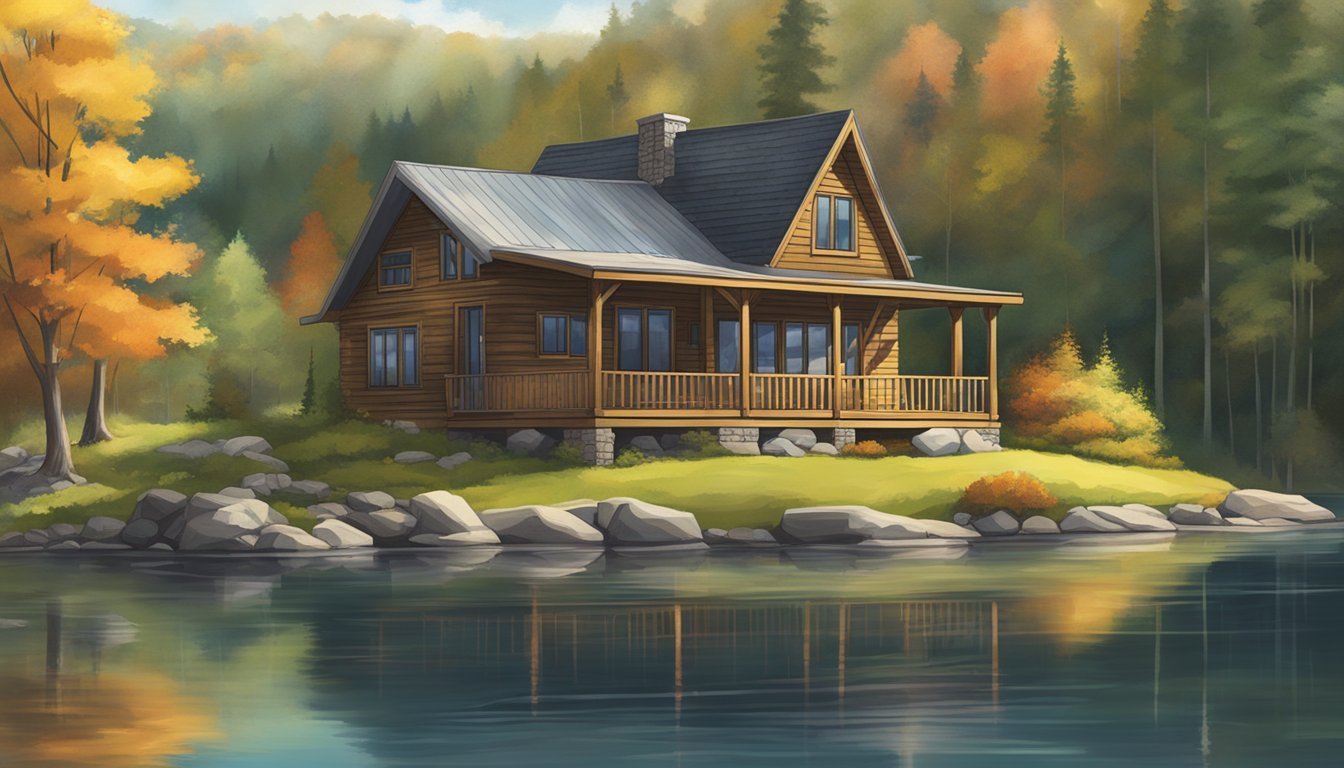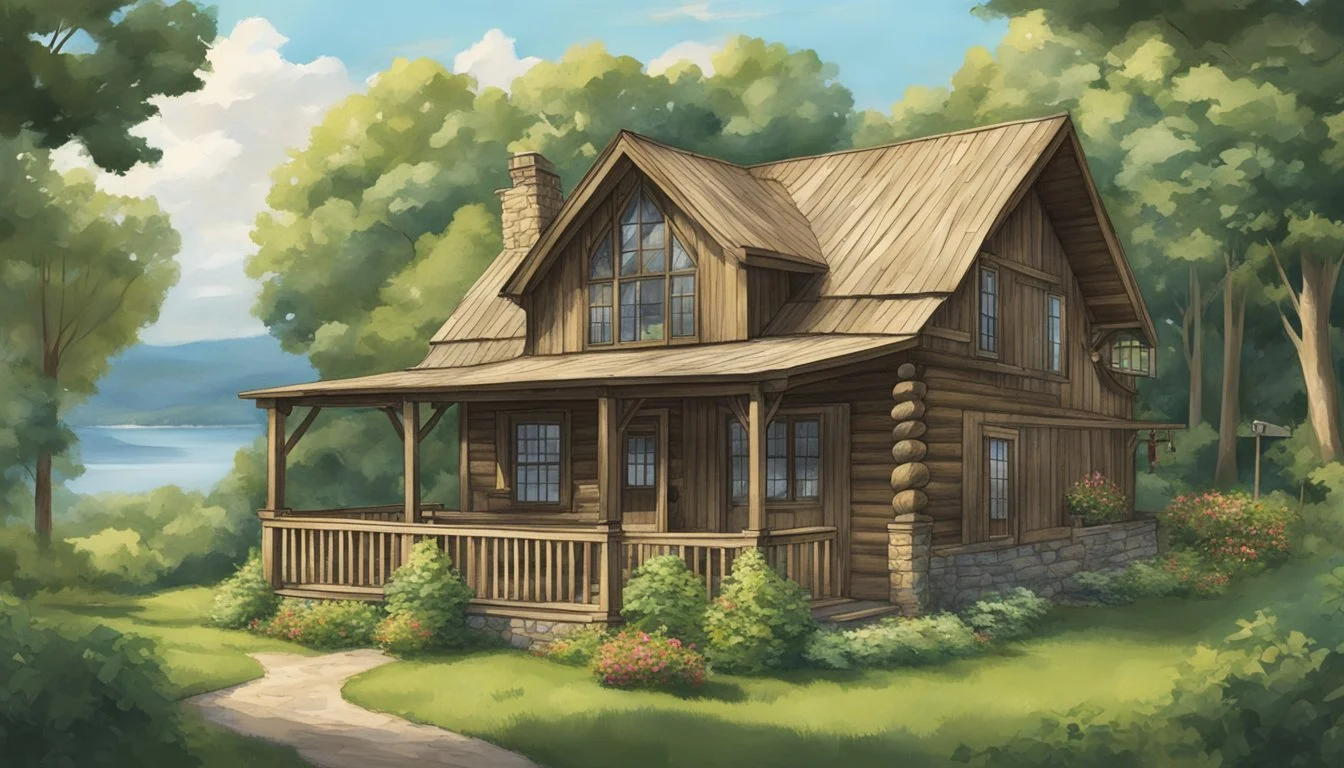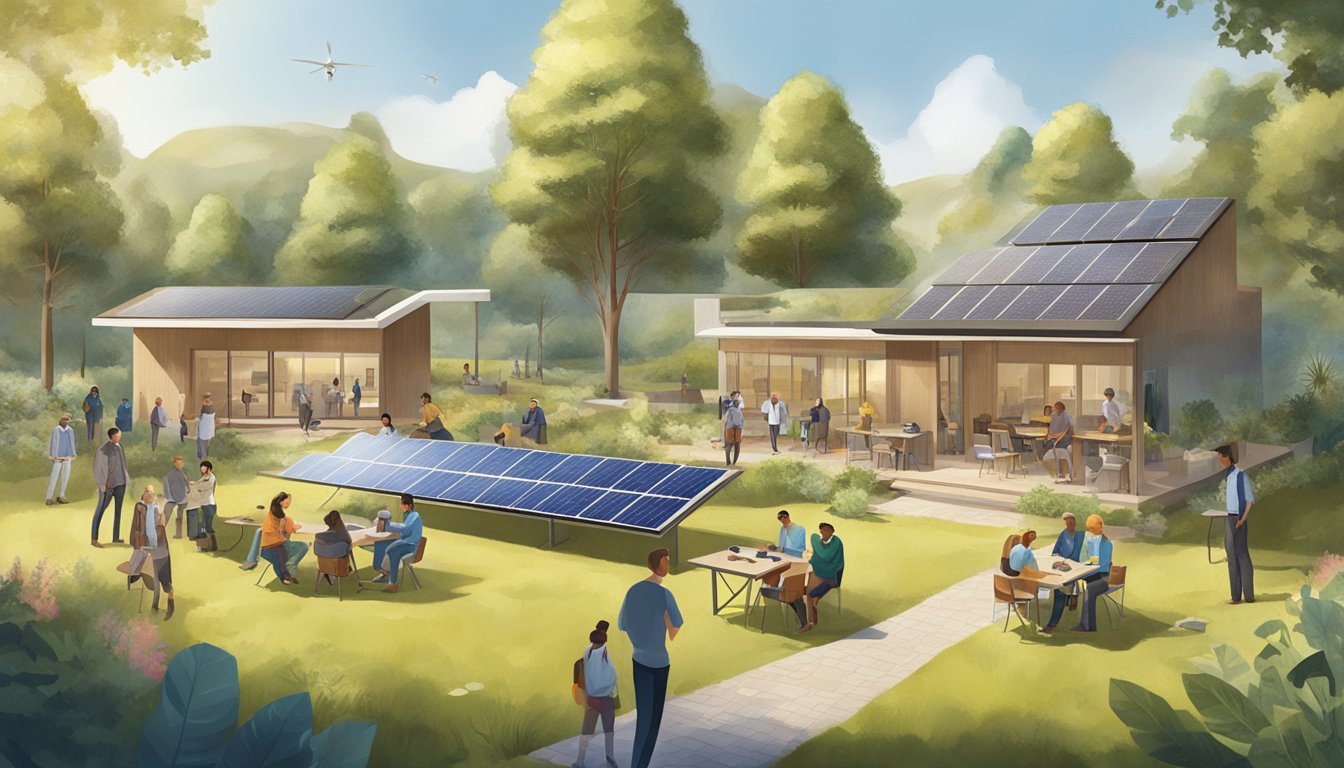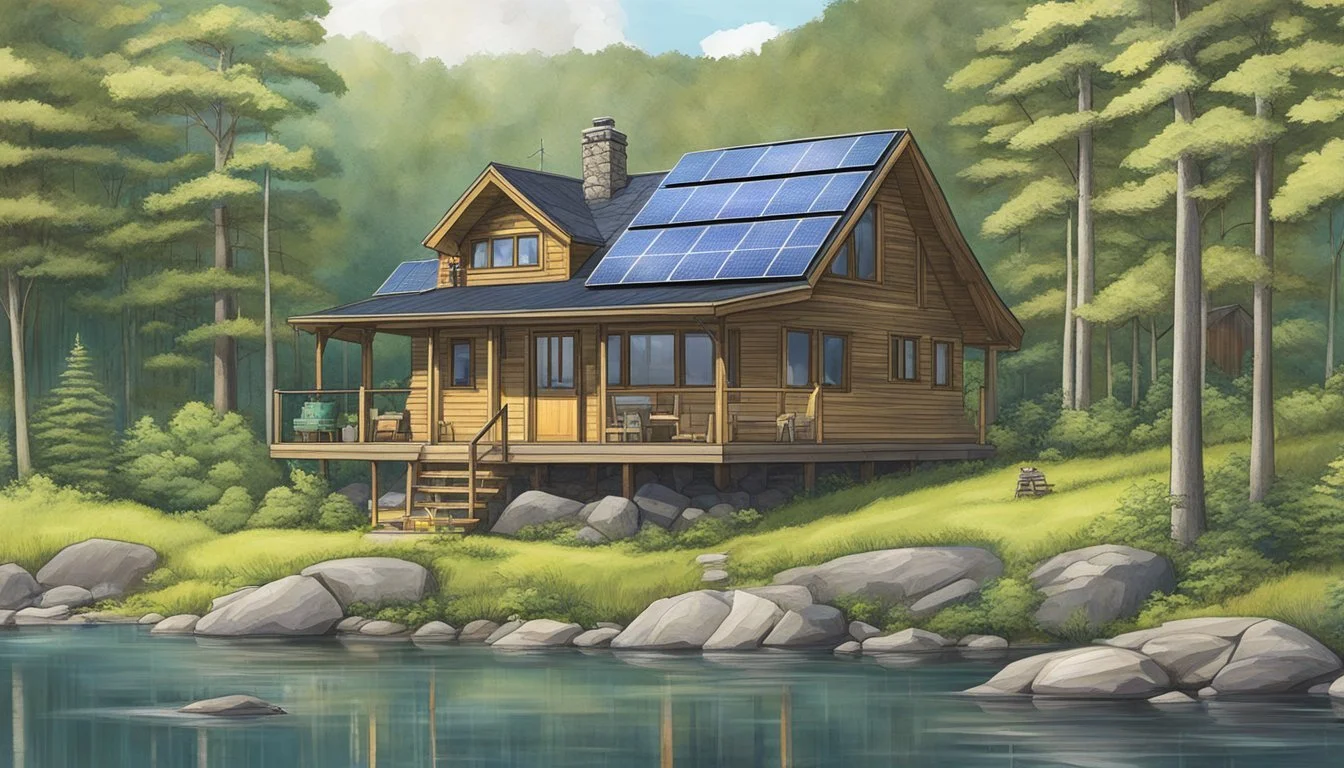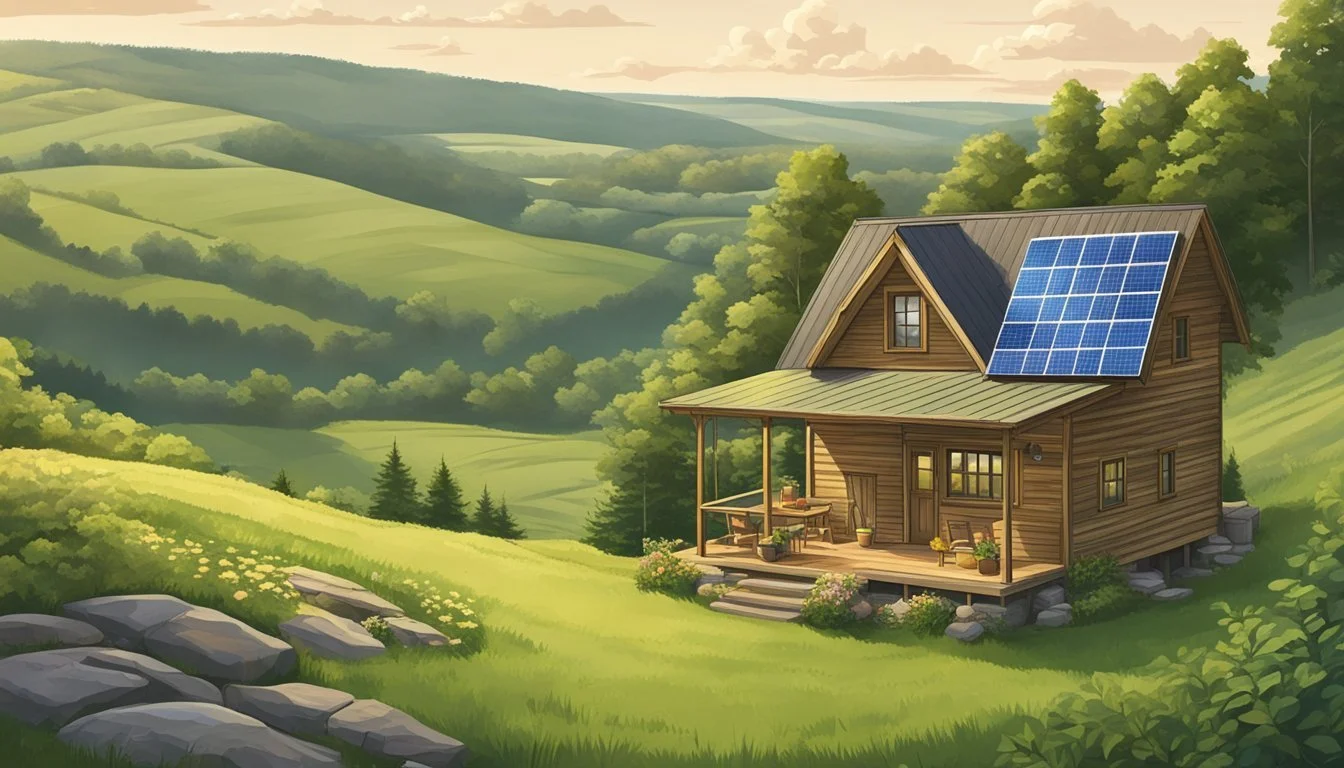Finger Lakes Off Grid Living
Sustainable Solutions and Scenic Retreats
Few places captivate the essence of off-grid living quite like New York's Finger Lakes region. Nestled amidst serene lakes and dense forests, this area offers a unique opportunity to disconnect from modern conveniences and embrace a sustainable, self-sufficient lifestyle. People eager to adopt this lifestyle can find serene, off-grid retreats and primitive campsites dotting the region. From the hillside cabins in Naples overlooking Canandaigua Lake to the EcoVillage at Ithaca boosting communal living, the Finger Lakes presents diverse options for those looking to live off the beaten path.
For those considering retirement or a lifestyle change, the Finger Lakes area provides not just natural beauty but also economical living options. Places like Seneca Falls are attractive with their affordability, making it possible to enjoy off-grid living without breaking the bank. The region's blend of accessibility and isolated retreats ensures that there's something for everyone, whether you are looking for a secluded cabin or a community-oriented environment.
Venturing into the Finger Lakes for off-grid living means immersing oneself in nature's bounty while still having access to essential amenities nearby. With extensive areas like the Sugar Hill State Forest and the Finger Lakes National Forest offering ample opportunities for outdoor activities, residents can enjoy a blend of solitude and community interaction. This balance makes the Finger Lakes an ideal location for those wanting to experience off-grid living to the fullest.
Understanding Off-Grid Living
Off-grid living means disconnecting from public utilities and systems such as electricity, water, and sewage. This lifestyle focuses on self-sufficiency and sustainability.
Cabins are commonly used structures for off-grid living. Built from materials like wood and hardwoods, they offer a sturdy and protective shelter.
Energy Sources
Using alternative energy sources is crucial. Solar panels and generators can provide electric power. For some, small-scale wind turbines are an option if conditions allow.
Water Systems
Water is sourced through wells, rainwater collection, or natural bodies of water like waterfalls. Purification systems are essential to ensure safe drinking water.
Waste Management
Composting techniques are employed for waste management. Compost toilets and greywater systems help maintain hygiene and environmental responsibility.
Environment
Situated deep in nature, these homes often find themselves amidst pines and other native flora. The proximity to nature offers peace and quiet rarely found in urban settings.
Benefits and Challenges
Living off-grid offers a chance to reconnect with nature. Organizations like the Nature Conservancy emphasize the importance of sustainable practices.
However, maintaining this lifestyle requires a significant initial investment in infrastructure and systems, along with ongoing maintenance. Adaptation to this lifestyle involves learning new skills and approaches to daily living.
With proper planning and resources, off-grid living can be a rewarding and environmentally friendly way to live.
Finding the Right Location
Choosing the right location for off-grid living in the Finger Lakes region entails assessing various factors such as proximity to resources, climate suitability, and potential for self-sustainability. Different areas offer unique advantages and characteristics that can greatly impact your off-grid experience.
Characteristics of the Finger Lakes Region
The Finger Lakes region in Central New York is known for its stunning natural beauty and accessibility to water resources. With 11 major lakes, including Canandaigua, Seneca, and Keuka, there are ample opportunities for freshwater access, which is crucial for off-grid living.
Waterfalls and spectacular views enhance the appeal, while the region's fertile soil supports agriculture. The climate is temperate but can be variable; winters are cold, requiring adequate preparation and resources for heating. The Finger Lakes Wine Country also offers diverse activities, enriching the lifestyle for off-grid enthusiasts.
Specific Areas and Their Appeal
Canandaigua Lake and Surrounding Areas: Known for its crystal-clear waters and proximity to towns like Naples and Canandaigua, this area is centrally located, providing a balanced mix of isolation and accessibility to amenities.
Seneca Lake and Watkins Glen: Seneca Lake is the largest of the Finger Lakes, offering abundant fishing and water activities. Watkins Glen, famed for its state park and waterfalls, attracts nature lovers year-round.
Cayuga and Ithaca: Ithaca, home to Cornell University, brings educational and cultural benefits. Cayuga Lake's extensive shoreline presents numerous opportunities for setting up an off-grid homestead.
Skaneateles and Owasco: These lakes are surrounded by scenic rural landscapes perfect for farming and sustainable living. Skaneateles is noted for its high water quality.
Choosing the right spot involves considering these diverse characteristics and how they align with your off-grid living goals.
Lifestyle and Community
The lifestyle in the Finger Lakes region offers a blend of rural charm and modern conveniences. Small towns like Waterloo and Seneca Falls are ideal for those seeking close-knit communities. These towns feature modest populations, making it easier to establish personal connections.
For nature enthusiasts, the Finger Lakes provide ample opportunities for off-grid living. Numerous nature conservancies and state parks, such as Letchworth State Park, offer a natural, serene environment. Outdoor activities like hiking and camping are popular.
Living off the grid often involves homesteading. Many residents manage their own small farms, producing vegetables, fruits, and livestock. Farm tours are common, providing valuable knowledge on sustainable living practices. Support for self-sufficiency extends through community workshops and local farmer's markets.
The region is also home to numerous campgrounds. These sites not only offer temporary refuge but also serve as venues for community gatherings and skill-sharing events. The communal atmosphere fosters learning and networking among like-minded individuals.
Breweries and local businesses thrive here too. They are central to the social fabric, providing venues for socialization and entertainment. These establishments often emphasize local ingredients, reflecting the region's commitment to sustainability and community support.
Accessibility to urban amenities remains convenient, with Rochester, NY being a short drive away. This proximity allows residents to access healthcare, advanced education, and shopping without disrupting their rural lifestyle.
In sum, the Finger Lakes region offers a balanced lifestyle that emphasizes community involvement, nature, and sustainable living practices. The blend of small-town atmosphere, outdoor activities, and entrepreneurial spirit makes it a unique place for off-grid living enthusiasts.
Homesteading Activities
In the Finger Lakes region, homesteading activities are diverse and can be uniquely catered to the area's natural resources and landscape. These activities include agriculture and farming, sustainable practices, and wildlife and hunting, all crucial for a thriving off-grid lifestyle.
Agriculture and Farming
Homesteads in the Finger Lakes often focus on growing crops and raising livestock. Chickens and goats are popular choices, providing eggs, meat, and milk. Honeybees are also kept for their honey and pollination benefits, crucial for garden vegetables.
The fertile soil in the region supports a variety of crops, including blueberries and mushrooms. Many homesteaders maintain a mushroom garden to diversify their produce.
A good homestead planner helps organize these activities, ensuring the farm operates efficiently. The Sugar Hill State Forest provides additional resources for foraging and wood supplies for homestead needs like fuel for a wood stove.
Sustainable Practices
Sustainable practices are central to homesteading in the Finger Lakes. Composting techniques are widely adopted to recycle organic waste into valuable fertilizer, enhancing soil fertility.
Foraging is another sustainable activity, with the area offering plenty of wild edibles like berries and mushrooms. Utilizing local forests, such as the Finger Lakes National Forest, provides essential resources while maintaining a balance with nature.
Installing solar panels and using rainwater harvesting systems are common off-grid solutions to reduce reliance on external utilities. These methods promote self-sufficiency and align with the eco-friendly goals of homesteading.
Wildlife and Hunting
The Finger Lakes region is rich in wildlife, offering ample opportunities for hunting as a supplementary food source. Deer and wild turkeys are prevalent, providing meat for homesteaders.
Hunting is regulated to ensure sustainability and conservation of local wildlife. The Nature Conservancy often collaborates with local hunters to maintain healthy animal populations.
Additionally, the varied ecosystems, including pines and hardwoods in local forests, create diverse habitats for wildlife. Engaging in responsible hunting practices ensures the continued abundance of these resources for future generations.
Outdoor Adventures
In the Finger Lakes region, outdoor activities abound for those looking to live off the grid. From hiking and biking to swimming and camping, there’s something for everyone.
Hiking enthusiasts will find an abundance of trails. Highlights include Watkins Glen State Park, known for its stunning gorges and waterfalls. With trails of varying difficulty, it’s a hiker's paradise. Another popular spot for hiking is around Seneca Lake, offering breathtaking views and year-round access.
Biking is another favorite outdoor activity. The diverse terrain around the lakes provides excellent routes. Riders can enjoy scenic paths around Hammondsport or more rugged mountain trails spread across the region.
For those interested in camping, there are numerous spots to set up a tent. Both primitive and developed campsites are available. Horse camping is also an option in certain areas, allowing riders to explore trails with their equine companions.
Swimming is a refreshing treat in the summer months. The numerous lakes, including Seneca Lake, provide cool, clean water perfect for a dip. Public beaches and secluded spots both offer excellent swimming opportunities.
Winter doesn’t mean the end of outdoor fun. The region transforms into a playground for skiing and other cold-weather activities. Cross-country skiing trails are plentiful, providing an excellent way to explore the snowy landscape.
Each season brings new opportunities for outdoor adventures in the Finger Lakes, making it an ideal location for off-grid living.
Tourism and Attractions
The Finger Lakes region is not only perfect for off-grid living but also brims with attractions that engage visitors with its natural beauty and rich heritage. From breathtaking state parks to renowned wineries and breweries, there is something for everyone.
State Parks and Natural Beauty
Watkins Glen State Park is a must-see. Its Gorge Trail features 19 waterfalls over a span of less than two miles, offering a scenic trek through an extraordinary landscape. Taughannock Falls provides another striking experience with its 215-foot drop, significantly higher than Niagara Falls.
For those who enjoy more serene spots, Buttermilk Falls State Park is known for its series of cascades and refreshing swimming holes. The Finger Lakes National Forest offers sprawling views and extensive hiking trails across a diverse environment of woodlands, grasslands, and gorges.
Waterfall Creek, nestled amidst this natural beauty, is also a hidden gem less frequented but equally stunning. Each of these locations showcases unique aspects of the region's natural splendor, enticing both the adventurous and the leisurely explorer.
Wineries and Breweries
The Finger Lakes Wine Trail is renowned for its picturesque vineyards and award-winning wines. Keuka Lake and Canandaigua are home to several famed wineries offering tours and tastings. In Hammondsport, one can relish the world-class wine produced in a charming, historic setting.
Geneva and Penn Yan also boast outstanding wineries that contribute to the region's reputation in viticulture. Tourists can indulge in sampling a variety of wines, from dry reds to crisp whites, enhanced by the unique terroir of the area.
For beer enthusiasts, there are numerous craft breweries throughout the region. Each brewery, whether in Corning with its creative brews or in lesser-known spots like Meads Creek, offers a unique spin. With such a variety of options, visitors can always find something to suit their palate.
Preparation and Logistics
A successful off-grid lifestyle in the Finger Lakes area requires careful planning and meticulous consideration of property selection and regulatory constraints. It is critical to understand both the location’s features and the legal requirements before making a commitment.
Choosing the Right Property
Selecting the right property involves more than just finding a picturesque location. Prospective buyers should consider land with natural water sources such as creeks, ponds, or close proximity to lakes to ensure a reliable supply.
Terrain and accessibility are crucial factors. Properties with a mixture of hardwoods and pines are ideal for sustainable living. An AWD vehicle might be necessary for navigating rugged paths.
Consider existing structures like an off-grid cabin or the potential for setting up camper/RV accommodations. Properties described as "priced to sell" may offer opportunities but require due diligence to assess their off-grid viability.
Zoning and Building Regulations
Compliance with zoning laws and building regulations is essential. These rules dictate what can be built and how properties can be used. Understanding these regulations helps avoid legal issues and ensures the property can support off-grid infrastructure.
Prospective owners must research local restrictions on installing solar panels, wind turbines, and other electric systems. Additionally, verify if the land allows for homesteading and if there are any limits on water use or waste management.
Engaging with local authorities early in the process can provide clarity and prevent future complications, ensuring a smooth transition to off-grid living in the Finger Lakes.
Alternative Energy Sources
Off-grid living in the Finger Lakes region can be highly sustainable with several alternative energy sources. These technologies provide reliable power while reducing reliance on traditional electric grids.
Solar Power
Solar panels are a popular choice for off-grid energy. They convert sunlight into electricity and are efficient even in less sunny climates. Federal tax credits can make solar installation more affordable.
Wind Turbines
In areas with steady wind, wind turbines produce clean energy efficiently. They work well alongside solar power for a balanced energy solution. Wind turbines are especially useful during cloudy weather when solar output may be low.
Micro-Grid Systems
Micro-grid systems offer a tailored solution for small communities. These systems integrate various renewable resources, ensuring a steady supply of energy. Wave power devices, although still in development, also hold promise for coastal communities.
Wood Stoves
For heating, wood stoves offer a traditional yet effective method. Using fallen or sustainably harvested wood provides warmth without relying on electric heaters. Wood stoves complement electric sources by reducing overall energy consumption.
Hydro Power
Hydro power can be an option for properties near water sources. Small hydroelectric systems harness the flow of water to generate power. While initial costs can be high, hydro power offers a continuous and dependable energy source.
Nature Conservancy Initiatives
Nature Conservancy efforts in the Finger Lakes focus on sustainable living practices, including promoting alternative energy use. Supporting such initiatives helps maintain the region's natural beauty and biodiversity.
These alternative energy sources provide viable options for sustainable off-grid living in the Finger Lakes.
Water and Waste Management
Water Sources
Living off grid in the Finger Lakes region offers various natural water sources. Creeks and spring-fed waterfalls are abundant, providing fresh water for daily needs. Gravity-fed systems can be set up to take advantage of these natural water flows, supplying clean water to your home efficiently.
Storage and Filtration
Proper storage and filtration are essential. Rainwater can be collected and stored in cisterns. Filters such as ceramic or activated carbon can ensure the water is safe to use. Ultraviolet (UV) purification systems are also effective for eliminating harmful pathogens from water.
Wastewater Management
Managing wastewater involves handling both greywater and blackwater. Greywater from sinks, showers, and washing machines can be treated minimally and reused for irrigation. It’s important to separate greywater from blackwater to simplify treatment processes.
Blackwater Treatment
Blackwater, which includes waste from toilets, requires more specialized treatment. Options include:
Septic Systems: A traditional septic tank allows solids to settle while liquids are dispersed through a septic field.
Compost Toilets: These toilets convert waste into compost through aerobic decomposition. They require regular maintenance but are ideal for sustainable living.
Aerobic Systems: These systems use oxygen to treat wastewater more effectively than septic systems.
Sustainable Practices
Implementing composting techniques for organic waste can reduce the load on waste treatment systems and create valuable compost for gardening. This promotes a closed-loop system, enhancing sustainability and self-reliance.
Compliance
Ensure all water and waste management systems comply with local regulations in the Finger Lakes area. Local authorities may have specific guidelines to follow for off-grid setups.
Using diverse strategies and maintaining proper systems ensures efficient and safe water and waste management in off-grid living scenarios in the Finger Lakes.
Security and Self-Sufficiency
Living off grid in the Finger Lakes region offers unique challenges and rewards in terms of security and self-sufficiency.
Security Measures:
Ensuring safety requires careful planning. Residents often install surveillance cameras, alarm systems, and sturdy locks. Secure perimeters through fencing or natural barriers like dense vegetation are common. Keeping a well-maintained communication system, such as radios or satellite phones, is crucial for emergencies.
Self-Sustainability:
Renewable Resources
Source electricity from renewable resources like solar panels or wind turbines. These are effective due to the region’s abundant sunlight and wind. Water harvesting systems and purification units ensure a reliable water supply. Groundwater access via wells is another viable method.
Food Production:
Grow vegetables and fruits in home gardens. Livestock such as chickens provide eggs and meat, enhancing food security. Techniques like composting and crop rotation improve soil health and yield.
Peace and Quiet
One advantage is the tranquil environment. With fewer human-made noises, it's a perfect place for those looking to reconnect with nature.
Community and Nature Conservancy
Living in a remote locale fosters tight-knit communities where neighbors rely on each other for support. Residents often engage in nature conservancy efforts, protecting local wildlife and natural resources, ensuring long-term habitat preservation.
In summary, adopting and maintaining the necessary precautions and systems can significantly enhance security and self-sufficiency while benefiting from the serene surroundings of Finger Lakes.
Recreation and Leisure
The Finger Lakes region offers a variety of outdoor activities for individuals interested in off-grid living. From camping and glamping spots to a wide range of outdoor sports and activities, there is something for everyone to enjoy.
Camping and Glamping Spots
In the Finger Lakes, you can find numerous camping and glamping options. Primitive roadside campsites are available in locations like Tioga County and Tompkins County. For a more upscale experience, consider places like Towner's Country Paradise or Tempest Ranch Camp, which offer more amenities.
For those seeking a mix of nature and comfort, glamping sites such as Wonderland Forest or Hipcamp listings provide cozy yurts or cabins. The Naples Cabin offers walk-in accommodations with stunning views of Canandaigua Lake. Adventurers can also explore the Sugar Hill State Forest and Recreation Area, perfect for a serene getaway.
Outdoor Sports and Activities
Outdoor enthusiasts will find no shortage of activities in the Finger Lakes. Popular hiking trails traverse the region, including paths in the Finger Lakes National Forest and the trails adjoining the Nature Conservancy areas in Naples. These trails cater to hikers and bikers alike, providing diverse terrains and scenic views.
Fishing and swimming are popular activities in lakes like Seneca and Canandaigua, while skiing opportunities are available in the colder months. Horse camping offers a unique experience for equestrian enthusiasts. Whether it's doggie camp activities or scenic morning hikes, the Finger Lakes have it all for those craving outdoor adventure.
Cultural Highlights and Local History
The Finger Lakes region is steeped in rich cultural history and distinctive local character. Each small town offers unique historical sites and vibrant cultural activities that draw visitors.
Seneca Falls, known as the birthplace of the Women's Rights Movement, hosts the Women's Rights National Historical Park. This park and the Women's Rights Hall of Fame commemorate pivotal moments in the fight for gender equality.
Ithaca is a cultural gem, famous for its progressive community and the Ithaca Farmers Market. Located in the heart of Cayuga Lake, Ithaca is also home to the Robert Treman State Park, featuring the scenic Lower Falls.
Corning, another notable town, is internationally recognized for its glassmaking heritage. The Corning Museum of Glass showcases the art, history, and science of glass through more than 50,000 objects and live demonstrations.
Geneva, based at the northern tip of Seneca Lake, is known for its historical landmarks and stunning lake views. This town's Smith Opera House is a historic venue that continues to serve as a cultural hub for performances and events.
Hammondsport lies at the southern end of Keuka Lake and is often referred to as the "Cradle of Aviation" due to Glenn Curtiss, an aviation pioneer who hailed from here. Visitors can explore the Glenn H. Curtiss Museum to learn about his contributions to early flight history.
The region is also home to over 130 wineries, many of which date back to the 19th century. This wine-rich history is likened to that of the Rhine Valley in Germany, making the Finger Lakes an essential destination for wine enthusiasts.
Art and music thrive in the Finger Lakes, with Rochester hosting the world-famous Fringe Festival and Syracuse offering the New York State Blues Fest. These events reflect the region’s vibrant artistic landscape.
Whether you're drawn by historical sites, small-town charm, or cultural festivals, the Finger Lakes region has a wealth of experiences to offer.
Education and Community Events
In the Finger Lakes region, education and community events play a vital role in promoting off-grid living and environmental stewardship. The area offers a range of activities designed to empower residents and visitors alike.
One of the major highlights is the Lake Friendly Living Awareness Month held every May. Organized by the Finger Lakes Watershed Alliance, this initiative features both virtual and in-person events. These events cover topics such as sustainable practices and watershed protection, making them an excellent resource for those interested in off-grid living.
Finger Lakes Community College in Dryden frequently hosts workshops and seminars on sustainable living. These educational sessions provide valuable insights into renewable energy, water conservation, and organic farming. Participation in these events is a great way to gain practical knowledge and meet like-minded individuals.
Rochester, NY, and nearby small towns also offer numerous community events. For instance, you can attend forums and DIY workshops such as rain barrel building, composting, and more. These events are designed to build resilient, eco-friendly communities and often take place in venues like the Hotel Canandaigua and local Nature Conservancy centers.
The region's lodges often participate by hosting educational retreats and seminars. These retreats offer a unique opportunity to learn about off-grid living while enjoying the scenic beauty of the Finger Lakes.
In summary, the Finger Lakes region provides a plethora of educational and community events dedicated to fostering a sustainable lifestyle. Whether through workshops, awareness months, or local forums, there's always something happening to engage and educate the community.
Real Estate Insights
The Finger Lakes region offers diverse real estate options for those interested in off-grid living. Properties here are often priced to sell, providing excellent value for the features they offer.
Many off-grid homes in the area are designed to blend with natural surroundings. They often include structures made from hardwoods and other sustainable materials. These homes frequently offer spectacular views of the lakes and surrounding landscapes, creating a serene living environment.
A variety of properties are available, from tiny houses and secluded cabins to expansive lands ideal for building your dream home. Listings often highlight the unique characteristics of each property.
For those seeking convenience, many properties in the Finger Lakes are centrally located near essential amenities while still offering the seclusion desired for off-grid living.
A snapshot of the market includes:
Property Type Average Price Notable Features Tiny Homes $100,000 - $200,000 Sustainable design, energy-efficient Secluded Cabins $200,000 - $400,000 Hardwood interiors, natural surroundings Large Properties $400,000+ Acres of land, scenic views, privacy
In the Finger Lakes, off-grid living means connecting with nature without sacrificing comfort or style.
Wildlife Conservation and Observations
In the Finger Lakes region, wildlife conservation and observations provide insight into the rich biodiversity and coordinated efforts to preserve both flora and fauna. Key elements of the area's conservation efforts include dedicated nature preserves and the activities of local conservancy groups.
Flora and Fauna of the Finger Lakes
The Finger Lakes region is home to a diverse array of wildlife, including deer and wild turkeys. The habitat supports various mammals, such as black bears and fishers. The area is also rich in plant life, featuring species like pines and blueberries, which create a thriving ecosystem for native species.
Native plants, such as the blueberry bushes, serve as food sources for both animals and people. Tall pines offer essential shelter and nesting sites for birds and small mammals. The interconnected ecosystems here support seasonal migrations and daily movements of wildlife.
Nature Preserves and Conservancy Efforts
Efforts to protect and conserve the Finger Lakes' natural habitats are spearheaded by organizations like the Finger Lakes Land Trust and the Nature Conservancy. These groups work to maintain ecosystems, ensuring the conservation of key areas such as the Finger Lakes National Forest and Underhill Forest and Farm.
Notable initiatives include the Land Trust's goal of connecting over 50,000 acres around Ithaca and Cayuga Lake. This initiative, termed the Emerald Necklace, aims to protect wildlife corridors essential for animal movement. Meanwhile, newly established preserves like the Owasco Bluffs provide undeveloped shoreline protection, crucial for maintaining biodiversity.
Agricultural Opportunities
The Finger Lakes region offers a fertile environment for a variety of agricultural activities. With its rich soil and favorable climate, residents can engage in livestock raising and organic gardening to foster self-sustainability.
Livestock and Poultry
Raising sheep is a popular choice due to their ability to provide both wool and meat. They are well-suited to the hilly terrain of the Finger Lakes. Chickens are another excellent option, producing a steady supply of eggs and meat.
Horses and donkeys can be valuable assets for transportation and labor, particularly in off-grid settings where machinery may be limited. Honeybees can be kept for honey production as well as for their essential role in crop pollination.
Organic Gardening and Permaculture
Organic gardening in the Finger Lakes can include cultivating blueberries, which thrive in the region's acidic soil. Mushroom gardens are another viable option, utilizing shaded wooded areas and compost. Permaculture practices often involve composting techniques that recycle organic waste to enrich soil fertility.
Building a permaculture system can incorporate composting techniques like vermicomposting, enhancing soil health and plant growth. Such systems promote sustainability and reduce the need for synthetic inputs, making them ideal for off-grid living.
Artisanal and Craft Experiences
The Finger Lakes region offers a rich tapestry of artisanal and craft experiences, from hands-on workshops to vibrant local markets. It’s an ideal destination for those interested in traditional and contemporary crafts.
Workshops and Classes
Craft enthusiasts can immerse themselves in various hands-on workshops. Places like MacKenzie-Childs in Aurora offer pottery painting and flower arranging sessions. Participants can learn directly from experienced artisans, gaining practical skills and creative inspiration.
In Corning, known for its glassmaking heritage, the Corning Museum of Glass provides opportunities to create unique glass artworks. Classes range from glassblowing to flameworking, accommodating beginners and advanced students.
The Rochester Folk Art Guild in Middlesex presents workshops in pottery, woodworking, and weaving. Located in a serene setting, it attracts individuals seeking to connect deeply with their craft.
Local Art and Craft Markets
Local markets are abundant throughout the Finger Lakes, showcasing a wide array of artisanal goods. The Windmill Farm & Craft Market in Penn Yan operates from May through December. With approximately 250 vendors, visitors can purchase farm foods, antiques, and artisanal crafts.
In Watkins Glen, markets often feature local food products alongside handcrafted items, making it a hub for both locals and tourists.
Events like the MacKenzie-Childs Artisan Craft Festival also draw crowds with their diverse offerings. These markets provide not only shopping opportunities but also a chance to interact with the artists behind the products.
Connectivity and Remote Work Options
Reliable connectivity is crucial for off-grid living, especially in the Finger Lakes region. Seneca, being centrally located, offers several options to ensure uninterrupted communication and remote work capabilities.
Satellite Internet
For those residing off-grid, satellite internet services like Starlink provide high-speed internet even in remote areas. Starlink's global coverage and low latency make it a popular choice for maintaining connectivity in secluded locations.
Mobile Hotspots
Using mobile hotspots is another viable option. Providers like T-Mobile offer specific plans such as T-Mobile Internet Lite, which caters to regions without access to 5G. These plans rely on 4G LTE networks, providing a dependable connection for basic internet needs.
Fixed Wireless Internet
Fixed wireless internet utilizes radio signals to deliver internet access. This option is suitable for off-grid homes near a centrally located hub or tower. It requires a direct line-of-sight to the signal source, ensuring stable and consistent connectivity.
Radio Communication
For emergency situations and basic communication needs, radio systems like HAM radios can be instrumental. They're reliable and don't depend on traditional internet infrastructure, making them a solid addition to other connectivity methods.
Powering Your Devices
Ensuring your connectivity options remain functional in an off-grid setting requires a regular power source. Solar panels paired with battery storage are an efficient solution to keep devices charged and maintain internet access.
These diverse connectivity options enable off-grid residents in the Finger Lakes, particularly around Seneca, to stay connected and work remotely, ensuring that their lifestyle remains both modern and sustainable.
Equipment and Tools Essentials
Living off the grid in the Finger Lakes requires specific equipment and tools to ensure comfort and self-sufficiency.
Basic Tools
A variety of hand tools such as hammers, screwdrivers, and wrenches are necessary. Additionally, power tools like drills and saws help with cabin construction and maintenance. A shovel, rake, and pitchfork are indispensable for gardening and other outdoor tasks.
Specialized Equipment
Investing in a wood stove is crucial for heating your cabin during the cold months. It ensures warmth and provides an alternative cooking source.
The all-wheel drive (AWD) vehicle is essential for navigating the often rugged and remote roads of the Finger Lakes region, particularly during winter.
Food Preservation
For food storage, canning jars and lids are vital. Pair this with a grain mill for processing grains and a meat grinder for preparing meat.
Emergency Supplies
A reliable emergency radio keeps residents informed during power outages or extreme weather conditions. Additionally, duct tape is a versatile tool for quick repairs.
Connectivity
While off-grid, maintaining some degree of connectivity can be important. Equipment for off-grid internet options ensures communication and access to information when needed.
Living Accommodations
A well-equipped camper can serve as a temporary shelter while constructing or renovating a cabin. It provides immediate, comfortable living quarters with necessary amenities.
Kitchen Essentials
Cast iron cookware is durable and versatile, ideal for cooking over an open flame or wood stove.
Equipping your off-grid home with these essential tools and devices will make the transition smoother and improve overall sustainability.
Seasonal Considerations and Weather Prep
The Finger Lakes region experiences a wide range of weather conditions throughout the year. Understanding and preparing for these seasonal changes is crucial for successful off-grid living.
Winter: Winters can be harsh with significant snowfall. Investing in an all-wheel-drive (AWD) vehicle is recommended for navigating snowy and icy roads. Ensure your home is well-insulated and stock up on firewood or other heating supplies.
Spring: Spring often brings unpredictable weather, including heavy rainfall. Flood-proof your home and ensure proper drainage around your property. It’s a good time to check roofing and clear any debris from gutters to prevent water damage.
Summer: Summers are usually warm and can be humid. Consider solar panels to capitalize on the abundant sunlight. Ensure your water supply is reliable as increased temperatures can lead to higher water usage.
Fall: Fall is the season for harvesting and preparing for winter. Collect and store crops, and make any necessary repairs to your home. Double-check that your heating system is in good order.
General Weather Prep:
Storm Preparedness: Keep emergency kits with essential supplies. Regularly check weather updates.
Fire Safety: Due to the possibility of wildfires, maintain a defensible space around your home by clearing flammable vegetation.
Solar Power Maintenance: Clean and inspect solar panels regularly to ensure maximum efficiency.
By anticipating these seasonal shifts and weather-related challenges, off-grid living in the Finger Lakes can be a rewarding and manageable experience.
Accessibility and Transportation
Accessibility is a key consideration for those interested in off-grid living in the Finger Lakes region. It is essential to have a reliable means of transportation, especially if the property is located in rural or remote areas.
For individuals with disabilities, careful planning is crucial. Many off-grid properties may require navigating uneven terrains. Choosing a centrally located area with good accessibility and proximity to main roads can mitigate some of these challenges.
An all-wheel-drive (AWD) vehicle is highly recommended for off-grid living in this region. These vehicles provide better traction and control on the rugged and sometimes unpaved roads found around lakes like Cayuga Lake and Keuka Lake.
The Finger Lakes area also offers several accessible outdoor destinations. For example, the trail systems around the lakes are designed to accommodate electric-assist wheelchairs. Locations such as Cass Park and Stewart Park, near Ithaca, provide accessible entry points.
For those residing off-grid but needing occasional urban amenities, Rochester, NY, serves as a valuable hub. It offers various accessible services and transportation options, reducing the travel burden for people with mobility issues.
In summary, proper vehicle choice and careful planning of off-grid properties are critical. Ensuring the property is accessible and centrally located with proximity to key sites can enhance the off-grid living experience in the Finger Lakes.
Healthcare and Emergency Services
Off-grid living in the Finger Lakes requires robust healthcare and emergency services to ensure community well-being. In areas near Rochester, NY, and various small towns, mobile clinics play a crucial role. They offer primary and emergency medical services for residents who might not have regular access to healthcare facilities.
Emergency Response Units are equipped with trained personnel and necessary medical equipment. These units are essential for handling unforeseen emergencies such as accidents, injuries, or sudden illnesses. Their presence ensures that even in remote regions, residents can receive timely medical assistance.
Federal funding has been instrumental in boosting healthcare access in the Finger Lakes. Recently, the region received over $3 million aimed at enhancing healthcare services and emergency operations. This funding is directed towards increasing access to healthcare for underrepresented communities and strengthening the healthcare infrastructure.
Agricultural workers in the Finger Lakes, who often reside off-grid, benefit from targeted healthcare initiatives. Since the area's economy heavily relies on agriculture, providing healthcare to migrant farmworkers and their families has been a priority. The Finger Lakes Migrant Health Care Project, founded in 1989, focuses on making quality healthcare accessible to this "invisible" population.
While lodging options in the area might be limited, healthcare services strive to overcome these challenges by providing flexible and mobile solutions. This ensures that even those in the most remote locations can access necessary medical care without significant delays.
Overall, the combination of mobile clinics, emergency response units, and federal funding ensures that off-grid communities in the Finger Lakes are well-equipped to handle healthcare and emergency needs, promoting a healthier and safer living environment.
Financial Considerations
Living off-grid in the Finger Lakes region involves significant initial investments and ongoing costs related to energy sources, water systems, and general upkeep. Understanding these financial aspects is crucial.
Costs of Off-Grid Living
Initial Investments:
The initial costs for setting up an off-grid living situation are substantial. Off-grid solar systems can cost between $15,000 and $30,000, while wind turbine systems might range from $30,000 to $50,000. The installation of these systems also may include labor costs.
Energy Sources:
Off-grid homeowners must invest in alternative energy sources. For example, a basic solar panel system price could fluctuate depending on the size and complexity. Additionally, they might need a backup generator, which adds more to the expenses.
Water Systems:
Water collection and storage systems are necessary. Rainwater harvesting setups and well drilling can incur high costs as well. A typical rainwater harvesting system might range from $2,000 to $10,000.
Maintenance Costs:
Regular maintenance is essential to ensure the systems function efficiently. This includes the upkeep of solar panels, generators, and water systems. Moreover, frequent replacement of parts might be required, adding up to the recurring costs.
Access to financial incentives and tax credits for renewable energy installations can offset some of the costs. Researching available grants can provide additional financial relief.
Children and Education
Living off-grid in the Finger Lakes region offers unique educational opportunities for children. The natural landscape, including forests and lakes, serves as an engaging classroom where they learn about ecology and conservation firsthand.
Daily routines play a crucial role in providing structure. Setting consistent schedules helps maintain a sense of normalcy. Regular meal times and designated play periods are essential.
Families can enroll their children in local schools in nearby small towns such as Dryden. These schools provide a blend of traditional and off-grid education, balancing academic needs with rural lifestyles.
Outdoor activities are a vital part of education. Children learn to take calculated risks and develop problem-solving skills by engaging in various off-grid tasks.
Educational Facilities Nearby
Public Schools: Local public schools in towns like Dryden offer comprehensive education.
Museums in Rochester, NY: The Strong National Museum of Play provides an enriching experience with numerous exhibits for children.
Nature Programs: Local nature conservancies offer programs that educate children on environmental stewardship.
Extracurricular Activities
Children can participate in sports and community events. Small towns frequently host activities that foster social skills and community integration.
Libraries: Town libraries are invaluable resources for educational materials and programs.
Clubs and Groups: Participation in clubs helps children develop diverse interests and skills.
Lodging options near educational centers simplify commuting for families who participate in off-grid living but still rely on nearby educational resources.
Off-grid living in the Finger Lakes, combined with the educational resources in surrounding towns, provides a balanced and enriching environment for children.
Closing Thoughts on Finger Lakes Off Grid Living
Living off-grid in the Finger Lakes region presents a unique opportunity to connect with nature. Nestled among serene lakes and lush forests, this lifestyle offers an escape from the hustle and bustle of urban life.
Pros:
Environmental Impact: Off-grid living in this area promotes sustainable practices, reducing reliance on fossil fuels and minimizing carbon footprints.
Self-Sufficiency: Independence is a key advantage. Access to natural resources like water and wood aids in sustainability.
Community: A strong sense of camaraderie exists among off-grid enthusiasts in the region.
Challenges:
Initial Investment: Setting up an off-grid homestead can be costly. Solar panels, water systems, and waste management facilities require substantial upfront expenses.
Maintenance: Regular upkeep of these systems demands continuous effort and resources.
Isolation: The seclusion of off-grid living can lead to feelings of loneliness, especially during harsh winters.
Nature Conservancy plays a role in preserving the pristine environment of the Finger Lakes. Their efforts ensure that the local ecosystem remains healthy, benefiting both wildlife and residents.
Whether you're drawn to the Finger Lakes for its natural beauty, the chance to minimize environmental impact, or the appeal of self-reliance, off-grid living here offers both rewards and challenges. Proper preparation and a commitment to sustainable living are essential for a successful transition.

